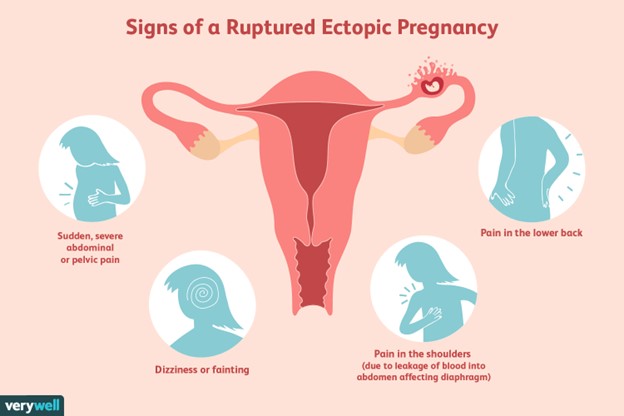A client is suspected of having a ruptured ectopic pregnancy. Which assessment would the nurse identify as the priority?
Hemorrhage
Edema
Infection
Jaundice
The Correct Answer is A
Choice A reason: Hemorrhage is the most life-threatening complication of a ruptured ectopic pregnancy, as it can lead to hypovolemic shock and death. The nurse should monitor the client's vital signs, blood loss, and level of consciousness, and administer fluids and blood products as ordered.
Choice B reason: Edema is not a common sign of a ruptured ectopic pregnancy, and it is not a priority over hemorrhage. Edema may be caused by other conditions, such as heart failure, kidney disease, or venous insufficiency.
Choice C reason: Infection is a possible complication of a ruptured ectopic pregnancy, but it is not as urgent as hemorrhage. Infection may manifest as fever, chills, malaise, or foul-smelling vaginal discharge. The nurse should administer antibiotics as ordered and monitor the client's temperature and white blood cell count.
Choice D reason: Jaundice is not a typical symptom of a ruptured ectopic pregnancy, and it is not a priority over hemorrhage. Jaundice may indicate liver dysfunction or hemolytic anemia, which are unrelated to ectopic pregnancy. The nurse should assess the client's skin and sclera color, and check the liver enzymes and bilirubin levels.

Nursing Test Bank
Naxlex Comprehensive Predictor Exams
Related Questions
Correct Answer is A
Explanation
Choice A Reason: This is correct because Chadwick's sign is a bluish or purplish discoloration of the cervix, vagina, and vulva caused by increased blood flow to the pelvic area during pregnancy. It is one of the earliest signs of pregnancy and can be observed as early as six to eight weeks of gestation.
Choice B Reason: This is incorrect because Goodell's sign is a softening of the cervix due to increased vascularity and edema during pregnancy. It is another early sign of pregnancy and can be detected by palpation around six to eight weeks of gestation.
Choice C Reason: This is incorrect because Hegar's sign is a softening of the lower uterine segment or isthmus during pregnancy. It is also an early sign of pregnancy and can be felt by bimanual examination around six to twelve weeks of gestation.
Choice D Reason: This is incorrect because Homan's sign is a pain in the calf or popliteal region when the foot is dorsiflexed. It is a sign of deep vein thrombosis, which is a potential complication of pregnancy, but not a normal finding.

Correct Answer is C
Explanation
Choice A Reason: This is incorrect because sickle-cell anemia is a genetic disorder that affects the shape and function of the red blood cells. It is not related to the AFP level, which is a protein produced by the fetal liver and yolk sac.
Choice B Reason: This is incorrect because cardiac defects are abnormalities in the structure or function of the heart. They are not related to the AFP level, which is a marker of neural tube defects and abdominal wall defects.
Choice C Reason: This is correct because Down syndrome is a chromosomal disorder that results from an extra copy of chromosome 21. It is associated with a decreased AFP level, as well as increased levels of human chorionic gonadotropin (hCG) and unconjugated estriol (uE3).
Choice D Reason: This is incorrect because respiratory disorders are problems that affect the lungs and breathing. They are not related to the AFP level, which reflects the fetal development and integrity.
Whether you are a student looking to ace your exams or a practicing nurse seeking to enhance your expertise , our nursing education contents will empower you with the confidence and competence to make a difference in the lives of patients and become a respected leader in the healthcare field.
Visit Naxlex, invest in your future and unlock endless possibilities with our unparalleled nursing education contents today
Report Wrong Answer on the Current Question
Do you disagree with the answer? If yes, what is your expected answer? Explain.
Kindly be descriptive with the issue you are facing.
